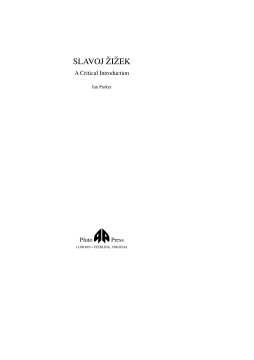
Additional Information
Book Details
Abstract
'When I read Ian Parker's manuscript, I experienced an underlying solidarity: despite obvious differences, we share the same basic political concerns and visions. And this makes his critical remarks always pertinent!' Slavoj Zizek
'This is not simply the best critical introduction to Zizek – in a much more radical sense, this is the only critical introduction to Zizek. Parker's study is much more than an important contribution to the ongoing debate: it redefines its very terms.' Yannis Stavrakakis, author of 'Lacan and the Political'
'A sharp, clear and radical analysis.' Christian Ingo Lenz Dunker, Professor of Psychoanalytic Theory and Lacanian Psychoanalyst, Sao Paulo, Brazil.
Since the publication of his first book in English in 1989, Slavoj Zizek has quickly become one of the most widely read and contentious intellectuals alive today. With dazzling wit and tremendous creativity he has produced innovative and challenging explorations of Lacan, Hegel and Marx, and used his insights to exhilarating effect in analyses of popular culture.
While Zizek is always engaging, he is also elusive and even contradictory. It can be very hard to finally determine where he stands on a particular issue. Is Zizek Marxist or Post-Marxist? How seriously should we take his recent turn to Christianity?
Slavoj Zizek: A Critical Introduction shows the reader a clear path through the twists and turns of Zizek's writings. Ian Parker takes Zizek's treatment of Hegel, Lacan and Marx in turn and outlines and assesses Zizek's interpretation and extension of these thinkers' theories. While Parker is never hastily dismissive of Zizek's innovations, he remains critical throughout, aware that the energy of Zizek's writing can be bewitching and beguiling as well as engaging and profound.
'A sharp, clear and radical analysis of Zizek's works which is sustained by an acute combination of a close reading of Zizek as a Lacanian and an examination of his cultural context'
Christian Ingo Lenz Dunker, Professor of Psychoanalytic Theory and Lacanian Psychoanalyst, Sao Paulo, Brazil.
'When I read Ian Parker's manuscript, I experienced an underlying solidarity: despite obvious differences, we share the same basic political concerns and visions. And this makes his critical remarks always pertinent!'
Slavoj Zizek
'This is not simply the best critical introduction to Zizek – in a much more radical sense, this is the only critical introduction to Zizek'
Yannis Stavrakakis, author of Lacan and the Political
Table of Contents
| Section Title | Page | Action | Price |
|---|---|---|---|
| Contents | vii | ||
| Acknowledgements | viii | ||
| Introduction: something retroactive and some anticipation | 1 | ||
| Zizek's sublime objects | 3 | ||
| Mapping this book | 5 | ||
| Some indivisible reminders | 10 | ||
| 1. Yugoslavia - to Slovenia | 11 | ||
| The perfection of the state | 12 | ||
| Brotherhood and unity | 19 | ||
| The Slovene springs | 28 | ||
| 2. Enlightenment - with Hegel | 36 | ||
| What is the thing with Hegel | 38 | ||
| Revolutionary fracture | 45 | ||
| Redemptive closure | 52 | ||
| 3. Psychoanalysis - from Lacan | 58 | ||
| The disappearing subject | 60 | ||
| The object of analysis | 68 | ||
| Clinic of the world | 74 | ||
| 4. Politics - repeating Marx | 82 | ||
| Against the rules of the game | 84 | ||
| Community and enmity | 91 | ||
| Did somebody say Marxism? | 97 | ||
| 5. Culture - acting out | 105 | ||
| His just desserts | 107 | ||
| Asymmetry: machine, object, application | 114 | ||
| The wrong man | 121 | ||
| Abbreviations | 128 | ||
| Notes | 129 | ||
| Bibliography | 158 | ||
| Index | 167 |
